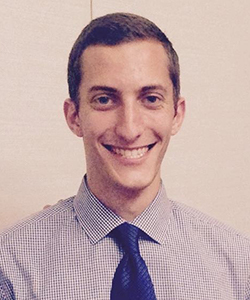
Degree: BS Physics (Astrophysics concentration) '18, Minor in Mathematics
Research Interests: Cosmology and computational astronomy, astrophysics and cosmology
Co-ops:
- Experimental Cosmology Researcher, University of Pennsylvania
- Computational Data Scientist, IceCube Neutrino Observatory
- Spectrum Systems Laboratory Technical Specialist, Lockheed Martin Advanced Technology Laboratories
Extracurricular activities: Society of Physics Students, Drexel University Circle K (service group), Pennoni Honors College, softball and football intramural teams
From conducting research for the South Pole's IceCube Neutrino Observatory to building homes through Drexel's Alternative Spring Break, Mark Giovinazzi has taken full advantage of his Drexel physics degree.
Tell us about the research you have been involved in at Drexel.
I am currently conducting my senior thesis research project, titled "Simulating Planetary Systems within Star Clusters," with physics professor Stephen McMillan, PhD. My work involves using AMUSE, a software framework in Python, to populate star clusters with planets and ask questions regarding the fates of these systems.
I have also worked under Naoko Kurahashi-Neilson, PhD, as a computational data scientist for the IceCube Neutrino Observatory. The best part about working for IceCube was the vast amount of presentation experience I gained; being a part of such a large collaboration allowed me to speak at three reputable physics conferences.
Before that, I was part of an experimental cosmology lab to assist in the design and construction of a balloon-borne telescope (BLAST-TNG) to study the effects of magnetic fields on star formation. The coolest aspect of this experience was building components that will fly from Antarctica to the edge of space.
What were some of your most memorable travel experiences through Drexel?
I took part in Drexel's Alternative Spring Break program to build houses with Habitat for Humanity in Bridgeport, Connecticut; this was a life-changing experience in which I befriended some exceptional people in the proud Bridgeport community and made lifelong friends from Drexel. Most recently, I had the privilege of presenting my astrophysics research at PhysCon in San Francisco, sponsored by both Drexel and the Society of Physics Students. Thanks to the funding, I was able to attend one of the world's largest undergraduate physics conferences, learn about the research of other physics undergraduates around the country, and explore one of my new favorite cities!
How were your co-op experiences?
The co-op program has treated me phenomenally, and I feel that I have gotten the most out of the program. I have done research in computational astronomy and astroparticle physics at Drexel, experimental cosmology at the University of Pennsylvania, and radar technologies and electronic warfare at Lockheed Martin. I learned not only about how physics research is structured, but also about the nature of research across other disciplines. Through my experiences, I have networked with graduate students, researchers, scientists and faculty from all over the world, many of whom have helped me tremendously as both a student and a person.
What has made your experience at Drexel special or unique?
I held a position at Lincoln Financial Field as a member of the Philadelphia Eagles for the first three years of my time at Drexel, and it has rooted me to the City of Brotherly Love more than I ever thought possible. Whether volunteering at the Philadelphia Science Festival, seeing the Tall Ships Festival, attending Phillies games, walking across the city at night, or admiring the skyline at three in the morning, I found a second home in Philly that has made my time here truly unique. Engaging in both the Drexel community and Philadelphia has helped me to make the most of my time at Drexel. To future students: get involved early and love this city. I promise you will not regret it.
Have you received any awards or scholarships while here at Drexel?
I am the recipient of the annual A.J. Drexel Scholarship, the one-time Drexel Family Scholarship, the M. Russell Wehr Physics Award, the Henry S.C. Chen Memorial Award for Physics, and the one-year Circle K Scholarship. I have been admitted into the Pennoni Honors College and STAR (Students Tackling Advance Research) Scholar program. I am also recognized as a Supernova Undergraduate Research Fellow.
Why would you recommend the Physics program at Drexel for undergraduates?
For starters, the faculty within the Drexel physics department are exceptional as professors, mentors and researchers. One of the first things Drexel physics majors learn is how to program computers, primarily in Python and C++; this is an up-and-coming skill that many other physics departments do not require. Physics majors who can write code are far more valuable to employers and graduate schools than those who cannot, as many real physics problems involve calculations that only a computer can solve.
This answer would not be complete if I failed to mention Drexel's co-op program. Co-op provides a taste of either physics research or physics in industry, or even work in another discipline. Physics majors can try multiple things to decide for themselves what they do and do not enjoy, and sometimes the best co-ops are the ones that students do not like. Students will have a tremendous amount of hard work to boast about on their résumé when it comes time to apply to jobs or graduate schools.
What advice do you have for a high school student looking for an undergraduate program?
I would tell any high school student to look for programs and opportunities that will distinguish them in job or grad school applications. For me, it was the physics department and co-op system that I felt would set me apart from other candidates. If you have questions about the department or college before applying, you should not be afraid to contact a professor; it makes for a good show of initiative and he/she will be more than happy to help.